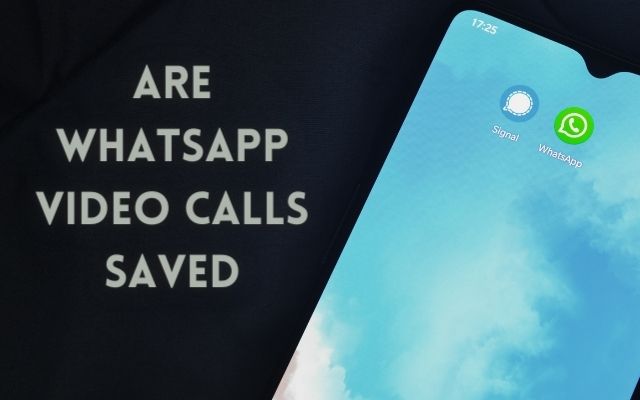Are whatsapp video calls saved? Uncover the truth

“Are WhatsApp Video Calls Saved?” – This question has been on the minds of many in the digital age. As we increasingly rely on digital platforms for communication, concerns about privacy and data security are more prevalent than ever.
WhatsApp, a popular messaging app, has become a primary means of communication for millions worldwide. Its video calling feature, in particular, has seen widespread use. But this brings us to the crucial question: Are WhatsApp video calls saved?
The answer to this question has significant implications. If these calls are saved, it could mean that our private conversations are not so private after all. On the other hand, if they aren’t, it could provide some reassurance about using the app for sensitive discussions.
In this article, we will delve into this topic, exploring the technical aspects of WhatsApp video calls, the company’s stance on privacy, and what it means for you as a user. We aim to provide a comprehensive answer to the question, “Are WhatsApp Video Calls Saved?” and shed light on the broader implications for digital communication privacy.
Stay tuned as we uncover the truth about WhatsApp video calls and their impact on our digital privacy. This is a journey you won’t want to miss.
Understanding WhatsApp
WhatsApp, launched in 2009, has grown exponentially over the years to become one of the most popular messaging apps globally. With over 2 billion users worldwide, it’s a primary communication tool for many, offering features like text messaging, voice calls, and video calls.
The video calling feature, introduced in 2016, has been particularly well-received. It allows users to connect visually, making conversations more personal and engaging. This feature has become increasingly important in recent years, with more people working and studying from home due to the global pandemic.
However, as with any digital platform, using WhatsApp comes with its own set of concerns, particularly regarding privacy and data security. These concerns aren’t unfounded. After all, we share a significant amount of personal information through these platforms, from casual conversations to sensitive data.
Now, we’ll take a closer look at how WhatsApp video calls work and explore the technical aspects that could potentially affect user privacy.
WhatsApp Video Calls: A Deep Dive
WhatsApp video calls have become a staple in our daily communication. But how do they work? Let’s take a closer look.
When you make a video call on WhatsApp, your voice and video are converted into small packets of data. These packets are then transmitted over the internet to the recipient. This process is known as Voice over Internet Protocol (VoIP).
One of the key aspects of WhatsApp video calls is end-to-end encryption. This means that only you and the person you’re communicating with can read what’s sent. Nobody in between, not even WhatsApp, can read or listen to them. This is a significant step towards ensuring user privacy.
However, the question remains: Are these video calls saved somewhere? Could they be accessed by third parties? These are valid concerns, given the amount of personal and sensitive information we share over video calls.
Now, we will delve into these privacy concerns and explore the implications of saved video calls. We will also look at WhatsApp’s official stance on this matter.
Privacy Concerns
In the digital age, privacy has become a paramount concern. As we share more of our lives online, the potential for misuse of our personal information has grown. This is particularly true when it comes to communication apps like WhatsApp, where we often share sensitive information.
When it comes to WhatsApp video calls, the primary concern is whether these calls are saved and, if so, who has access to them. If these calls are saved, they could potentially be accessed by third parties, leading to a breach of privacy. This is a concern not just for individual users, but also for businesses that use WhatsApp for communication.
Another concern is the potential for misuse of saved video calls. If these calls are saved and fall into the wrong hands, they could be used for malicious purposes. This could range from blackmail to identity theft.
Now, we will address the burning question: Are WhatsApp video calls saved? We will analyze the claim and present evidence both supporting and contradicting it.
Are WhatsApp Video Calls Saved?
The question of whether WhatsApp video calls are saved is a critical one. The answer has significant implications for our privacy and the security of our personal information.
WhatsApp uses end-to-end encryption for all its communications, including video calls. This means that only the sender and receiver of the communication can decrypt and view it. Not even WhatsApp can access these communications. This is a strong measure to protect user privacy.
However, does this mean that WhatsApp video calls are not saved? According to WhatsApp’s official statements, video calls are not stored on their servers. Once the call has ended, the data packets used to transmit the video and audio are discarded.
This means that, under normal circumstances, your WhatsApp video calls are not saved and cannot be accessed by third parties. However, it’s important to note that if a user chooses to record a video call using a third-party app, that recording can be saved and potentially accessed later.
Now, we will look at WhatsApp’s official stance on privacy and what it means for users.
WhatsApp’s Stance on Privacy
WhatsApp has always maintained that privacy is at the core of their service. They have implemented several measures to ensure user privacy, the most significant of which is end-to-end encryption. This encryption ensures that only the sender and receiver can access the messages, calls, photos, and videos sent on the platform.
According to WhatsApp’s official statements, they do not store personal messages or calls on their servers once they have been delivered. This includes video calls. The company has stated that their servers only retain undelivered messages for a period of 30 days, after which they are deleted.
Furthermore, WhatsApp has clarified that they do not share contact lists with Facebook (their parent company). They have also stated that they do not allow banner ads and will not introduce them in the future.
How to Ensure Your Privacy on WhatsApp
In the digital age, ensuring your privacy is crucial. Here are some tips to help you maintain your privacy while using WhatsApp:
- Use end-to-end encryption: WhatsApp provides end-to-end encryption for all its communications. This means that only the sender and receiver can access the messages, calls, photos, and videos sent on the platform.
- Be cautious with third-party apps: Some third-party apps claim to enhance your WhatsApp experience but may compromise your privacy. Always verify the credibility of these apps before using them.
- Manage your privacy settings: WhatsApp allows you to control who can see your last seen, profile photo, about, status, and live location. Make sure to review these settings regularly.
- Be mindful of what you share: Avoid sharing sensitive information like credit card numbers, passwords, and personal identification numbers (PINs) on WhatsApp.
- Enable two-step verification: This adds an extra layer of security to your account. If someone tries to verify your phone number on WhatsApp, they will need a six-digit PIN that you create using this feature.
Remember, while WhatsApp has implemented measures to protect user privacy, it’s also up to you to use these features effectively. Stay safe and secure as you continue to connect with others through WhatsApp.
Conclusion
We’ve embarked on a journey to uncover the truth about WhatsApp video calls, delving into the technical aspects, privacy concerns, and measures to ensure your privacy. The question “Are WhatsApp Video Calls Saved?” has been thoroughly explored, and the answer is clear: According to WhatsApp’s official statements, video calls are not stored on their servers.
WhatsApp’s commitment to privacy is evident in its use of end-to-end encryption and its privacy policy. However, it’s also crucial for users to be proactive in protecting their privacy. By being mindful of what we share and making full use of WhatsApp’s privacy settings, we can communicate securely.
In the digital age, privacy is paramount. As we continue to rely on digital platforms like WhatsApp for communication, it’s essential to stay informed about how these platforms handle our data. Remember, knowledge is power, and staying informed is the first step towards ensuring our privacy.






